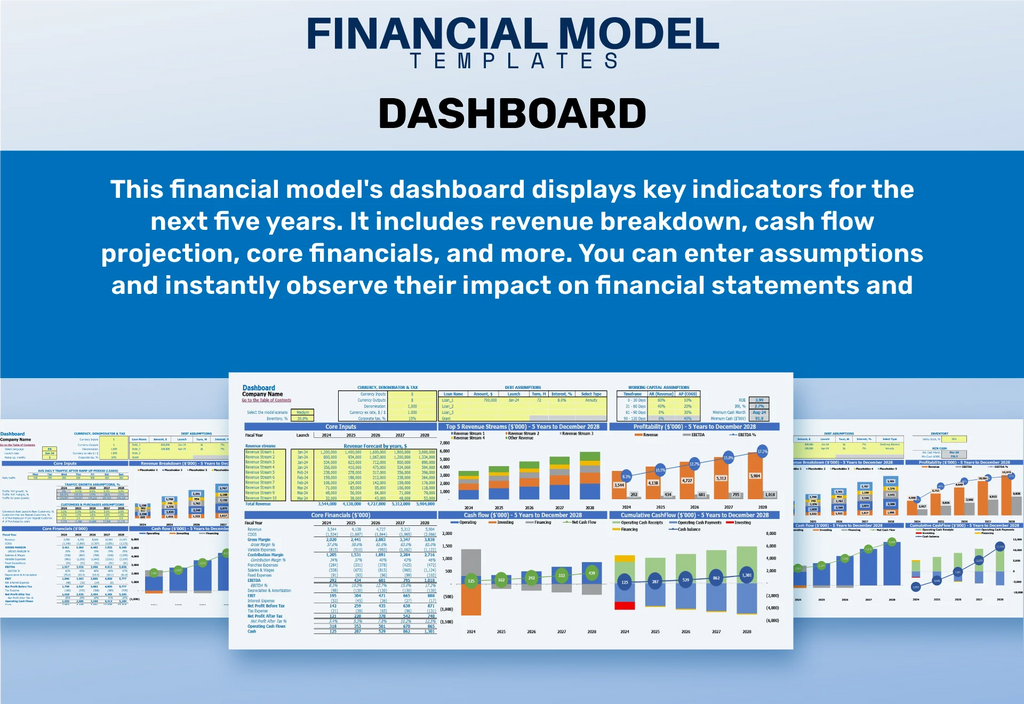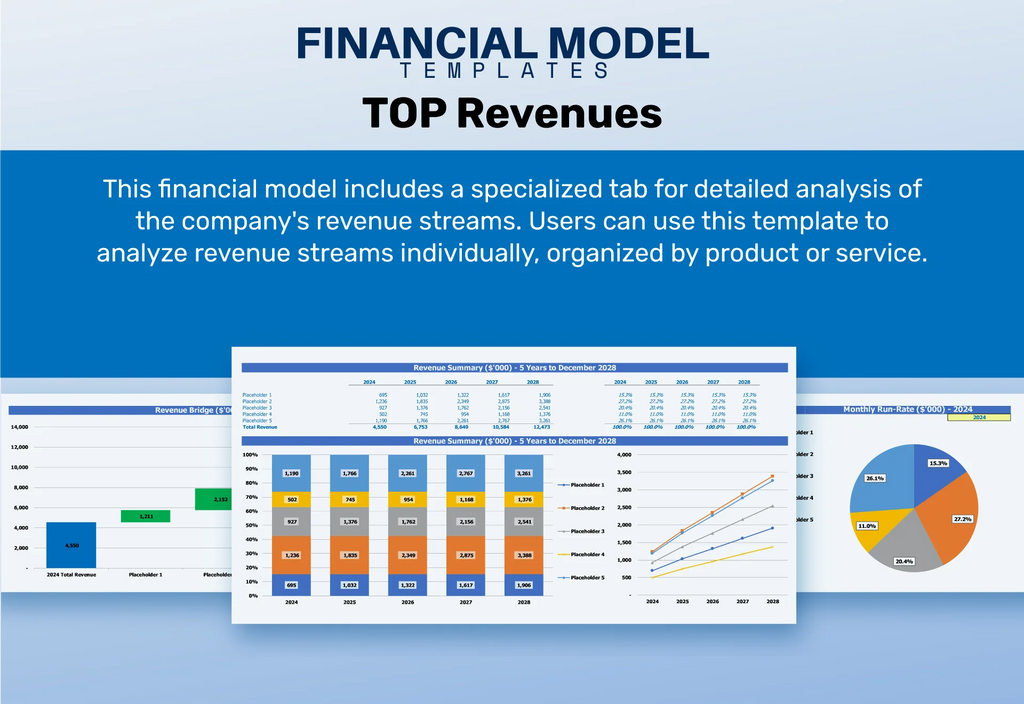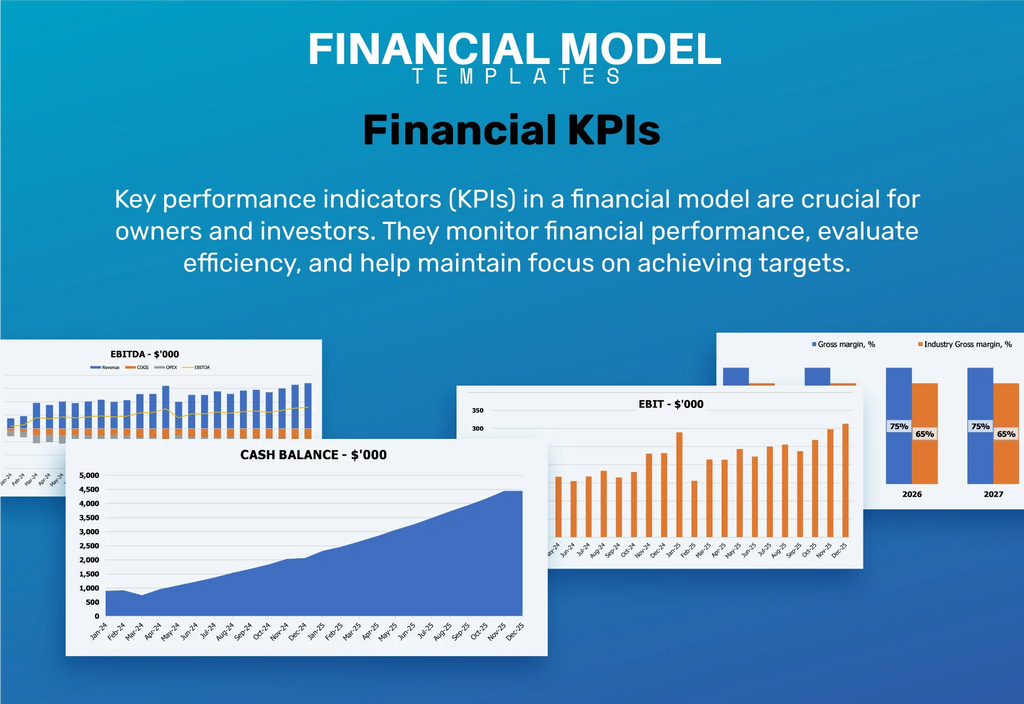Demolition Waste Recycling Service Financial Model

- ✔ 5-Year Financial Projections
- ✔ 100% Editable
- ✔ Investor-Approved Valuation Models
- ✔ MAC/PC Compatible, Fully Unlocked
- ✔ No Accounting Or Financial Knowledge
Demolition Waste Recycling Service Financial Model
Bundle Includes:
-
Financial Model
-
Business Plan
-
Pitch Deck
-
Financial Dashboard
ALL IN ONE MEGA PACK - CONSIST OF:
demolition waste recycling service Financial Model/Business Plan Excel Template
Pitch Deck Template For PowerPoint, Keynote & Google Slides
Business Plan Guide and Business Plan Template in MS Word Format
Financial Dashboard in Excel To Track Your Business Performance
DEMOLITION WASTE RECYCLING SERVICE FINANCIAL MODEL FOR STARTUP INFO
Highlights
This comprehensive demolition waste management financial model serves as an essential tool for both startups and established entities in the construction debris recycling sector. With features designed for constructing projected revenue from recyclables and detailed cost analysis of recycling services, it enables users to prepare forecast income statements, cash flow projections, and balance sheets over monthly and annual timelines. By focusing on sustainable demolition practices and circular economy strategies in construction, it supports effective waste stream optimization and aids in the financial feasibility of recycling initiatives. Additionally, this model can help assess profit margins in recycling and ensure regulatory compliance in waste management, making it a vital resource for enhancing resource recovery and maximizing demolition agency profitability.
The financial model overview addresses key pain points for buyers by providing a comprehensive 5-year financial projection specifically tailored for demolition waste management services, streamlining the process of forecasting income statements and conducting break-even analyses; this automated tool enhances decision-making through structured financial metrics compliant with GAAP/IFRS standards. By incorporating critical elements such as cost analysis of recycling services and projected revenue from recyclables, users can better understand profit margins in recycling and evaluate the financial feasibility of adopting sustainable demolition practices. The template also supports waste stream optimization and construction waste reduction strategies, ensuring that demolition agencies can achieve profitability while adhering to regulatory compliance in waste management. Overall, this model serves as an essential resource for effectively navigating the complexities of a recycling business model within the circular economy in construction.
Description
The demolition waste recycling service financial model provides a comprehensive framework that encompasses essential financial statements and performance metrics necessary for informed decision-making, addressing operational and financial risks while promoting sustainable demolition practices. This adaptable Excel template allows users to create detailed 5-year projections, including profit and loss statements, balance sheets, and cash flow analyses, facilitating a thorough cost analysis of recycling services. Additionally, the model incorporates key performance indicators (KPIs) and financial performance ratios crucial for assessing business profitability and liquidity, enabling users to evaluate the financial feasibility of recycling initiatives. Users can easily customize the template with basic Excel skills, automatically updating all relevant metrics upon input adjustments, and generating various reports, such as break-even analysis and cash flow forecasts, to support strategic planning and enhance profit margins in the recycling business model.
DEMOLITION WASTE RECYCLING SERVICE FINANCIAL MODEL REPORTS
All in One Place
The demolition waste management financial model template equips business managers and owners with strategic insights on expenses and projected revenue from recyclables. This comprehensive approach enhances the overall business canvas, aligning with sustainable demolition practices and construction debris recycling efforts. By emphasizing cost analysis of recycling services and waste stream optimization, it supports profitable decision-making. Additionally, it aids in understanding the financial feasibility of recycling initiatives, ensuring compliance with regulatory standards while fostering a circular economy in construction. With a focus on environmental impact and resource recovery, this template is crucial for maximizing profit margins in recycling.

Dashboard
Our financial model template for business plans features an intuitive dashboard highlighting key financial metrics over specific timeframes. This dynamic interface presents essential data from cash flow forecasts, profit and loss statements, and revenue breakdowns—both monthly and annually. By visualizing these indicators through engaging charts and graphs, users can easily assess financial feasibility, project revenue from recyclables, and analyze profit margins in recycling. Ultimately, this tool supports effective decision-making in demolition waste management and construction debris recycling, aligning with sustainable practices and circular economy principles.

Business Financial Statements
Our innovative financial projection startup empowers owners to develop comprehensive financial statements, calculations, and forecasts tailored for their recycling business model. By streamlining waste disposal financial analysis, we enhance stakeholder communication regarding business performance through automated metrics. Our Excel template not only generates insightful presentations with visually engaging financial graphs and charts but also simplifies the process of showcasing projected revenue from recyclables to potential investors. This strategic approach aids in waste stream optimization and supports sustainable demolition practices within the circular economy in construction, enhancing both profitability and regulatory compliance in waste management.

Sources And Uses Statement
Companies prioritize sources and uses charts as they effectively illustrate funding sources and cash flow directions. This clarity is vital for assessing the financial feasibility of recycling initiatives, especially in demolition waste management and construction debris recycling. By implementing sustainable demolition practices and optimizing waste streams, businesses can enhance profit margins in recycling. A thorough financial analysis of waste disposal, combined with projected revenue from recyclables, empowers companies to align their operations with circular economy principles while ensuring compliance with regulatory standards. This approach not only bolsters profitability but also minimizes the environmental impact of demolition and construction activities.

Break Even Point In Sales Dollars
A breakeven analysis is essential for any recycling business model, especially in demolition waste management. This financial tool evaluates the necessary sales volume to cover all costs, including fixed and variable expenses associated with operations. By accurately projecting revenue from recyclables and analyzing profit margins in recycling, companies can enhance their strategies for construction debris recycling and optimize waste stream management. Such assessments not only inform financial feasibility but also support sustainable demolition practices and contribute to the circular economy in construction, ultimately reducing environmental impact while ensuring regulatory compliance.

Top Revenue
Our startup costs template's Top Revenue tab generates demand reports for demolition waste management services, enabling scenario modeling to assess profitability and attractiveness. The financial projections spreadsheet further aids in analyzing revenue depth and bridges, essential for agile business operations. By forecasting varying demand levels—considering time factors like weekdays versus weekends—this tool helps optimize resource allocation and manpower deployment. Ultimately, it empowers your recycling business model to enhance operational efficiency while promoting sustainable demolition practices that align with circular economy principles.

Business Top Expenses Spreadsheet
Understanding the origins of your expenses is crucial for effective financial management. The "Top Expenses" section of the bottom-up financial model allows businesses to analyze annual expenditures, categorizing them into four distinct groups, including customer acquisition costs and fixed costs. This segmentation empowers companies to identify key drivers of their expense structure, facilitating better decision-making around resource allocation. By implementing these insights, organizations can optimize their waste stream management and enhance profitability, particularly in sectors like demolition and construction, where sustainable practices and recycling efficiencies are increasingly vital.

DEMOLITION WASTE RECYCLING SERVICE FINANCIAL PROJECTION EXPENSES
Costs
The demolition waste recycling service's three-statement financial model is essential for estimating costs, risks, and key performance ratios. This startup financial model excel template guides you in identifying critical areas that require attention, resources, and strategic focus. It serves as a valuable diagnostic tool, pinpointing potential challenges while efficiently guiding you toward solutions. Understanding expenses in relation to your business plan is crucial, as this insight supports investor applications and credit acquisition. Emphasizing sustainable demolition practices and waste stream optimization can significantly enhance both profitability and regulatory compliance in waste management.

CAPEX Spending
Capital expenditures (CapEx) play a crucial role in the financial landscape of both startups and expanding businesses, particularly in sectors like sustainable demolition practices and construction debris recycling. Investing in new property, plant, and equipment (PP&E) can enhance waste disposal financial analysis and support a recycling business model focused on circular economy principles. Financial analysts prioritize these expenditures in balance sheet forecasts, as they are essential for optimizing waste streams and improving profit margins in recycling services. Ultimately, understanding the financial feasibility of recycling initiatives is paramount for ensuring long-term profitability and regulatory compliance in waste management.

Loan Financing Calculator
Start-ups and emerging businesses must diligently monitor and manage their loan repayment schedules, detailing each loan's amounts and maturity terms. Integrating this payback plan into cash flow analyses is crucial, as interest expenses significantly affect overall cash flow models. Additionally, the closing debt levels are reflected in the projected balance sheet. As part of effective financial management, principal repayments must be tracked within cash flow models, ensuring regulatory compliance in waste management and supporting sustainable demolition practices, such as construction debris recycling and resource recovery strategies in the circular economy.

DEMOLITION WASTE RECYCLING SERVICE EXCEL FINANCIAL MODEL METRICS
Financial KPIs
The feasibility study template includes essential key performance indicators (KPIs) crucial for both the firm and the construction sector. These metrics encompass profitability, cash flow, and liquidity, providing a comprehensive financial analysis. Additionally, it features KPIs tailored for attracting investment, aligning with sustainable demolition practices and waste disposal financial analysis. By incorporating insights on resource recovery financial metrics and projected revenue from recyclables, the template supports effective waste stream optimization. This approach fosters a circular economy in construction, ultimately enhancing the profitability and operational efficiency of demolition service offerings.

Cash Flow Forecast Excel
Effective cash flow management is crucial for any business, especially within demolition waste management. A comprehensive five-year financial projection template aids in assessing the financial viability of recycling operations, enabling companies to forecast cash inflows and outflows. This tool evaluates key factors such as revenue, working capital, and debt, ultimately aiding in the cost analysis of recycling services. By focusing on sustainable demolition practices and construction debris recycling, firms can enhance profit margins while complying with regulatory requirements. Optimizing waste streams and exploring urban mining opportunities also bolster resource recovery, ensuring a robust and circular economy in construction.

KPI Benchmarks
Benchmarking is a critical tool for evaluating and comparing business performance across key financial indicators, such as profit margins and cost analysis. For startups in the demolition waste management sector, this practice sheds light on their competitive stance and identifies opportunities for improvement. By analyzing metrics like cost per unit and productivity margins against industry standards, companies can refine their demolition service profitability. Leveraging benchmarking enhances sustainability efforts, supports construction waste reduction strategies, and informs resource recovery financial metrics, ultimately fostering a circular economy in construction and optimizing waste stream management.

P&L Statement Excel
This Excel-based financial modeling template facilitates accurate monthly profit and loss statements, essential for both short-term forecasts and long-term planning of up to five years. Its integration with other financial statements ensures seamless updates and real-time insights into your demolition waste management and construction debris recycling operations. By aligning your profit and loss projections with changes in assumptions, this tool empowers informed decision-making, enhancing your recycling business model’s financial feasibility. Optimize your resource recovery financial metrics and strengthen your approach to sustainable demolition practices with this comprehensive financial management solution.

Pro Forma Balance Sheet Template Excel
The projected balance sheet over five years serves as a cornerstone for assessing a company's asset and liability landscape. Similarly, the projected income statement template highlights operational outcomes and provides a snapshot of financial health. For startups, a pro forma balance sheet reveals true business value and differentiates between business and investor equity. Additionally, forecasting key indicators such as turnover and liquidity ratios enables a thorough evaluation of financial feasibility, essential for informed decision-making in sustainable demolition practices and optimizing waste management strategies within the circular economy of construction.

DEMOLITION WASTE RECYCLING SERVICE FINANCIAL PROJECTION TEMPLATE VALUATION
Startup Valuation Model
Our pre-built valuation template for demolition waste management offers essential insights that investors frequently seek. The weighted average cost of capital (WACC) serves as a vital metric, illustrating the minimum return on invested capital, crucial for informed decision-making. Additionally, free cash flow (FCF) represents the cash available for growth and reinvestment. Coupled with discounted cash flow analysis, these metrics provide a comprehensive view of projected financial performance, ensuring your recycling business model aligns with sustainable demolition practices and optimizes resource recovery, enhancing both profitability and regulatory compliance in waste management.

Cap Table
A cap table calculator is an essential tool that tracks and evaluates the impact of multiple financing rounds on investors' equity and the company's financial performance. With data updated after each round, it provides a clear overview of ownership stakes and potential returns. This financial analysis is crucial for understanding the implications of investment decisions, particularly in sectors like construction where sustainable practices and profitability are paramount. By incorporating insights from waste disposal financial metrics and recycling business models, stakeholders can make informed choices that align with both profitability and environmental responsibility.

KEY FEATURES
Implementing a recycling business model enhances profit margins while effectively managing demolition waste and reducing environmental impact.
Optimize your recycling business model effortlessly with our Excel financial model, enhancing profitability while reducing reliance on costly consultants.
Implementing a robust waste disposal financial analysis maximizes profit margins in recycling while promoting sustainable demolition practices and circular economy objectives.
A robust financial model streamlines waste disposal analysis, enabling efficient construction debris recycling and maximizing profits in sustainable operations.
Implementing a robust financial model in demolition waste management helps identify cash gaps and surpluses, enhancing profitability and sustainability.
Effective cash flow forecasting empowers businesses to proactively manage deficits and maximize opportunities for reinvestment, enhancing overall financial health.
Implementing a robust recycling business model enhances resource recovery financial metrics, maximizing profit margins while supporting sustainable demolition practices.
Implementing a robust financial model empowers businesses to effectively manage cash surpluses and invest in sustainable demolition practices.
Implementing a strong recycling business model enhances profit margins while promoting sustainable demolition practices and optimizing waste streams.
With a robust financial model for demolition waste management, your recycling startup will attract investors eager to engage.
ADVANTAGES
A financial model for demolition waste recycling services enhances profitability and sustainability through effective cost analysis and resource recovery.
Implementing a robust recycling business model enhances profit margins and optimizes waste streams in demolition waste management.
Implementing a recycling business model enhances profit margins by optimizing waste streams and ensuring financial feasibility in demolition waste management.
Utilizing a demolition waste recycling service can enhance profit margins while promoting sustainable practices in the construction industry.
Utilizing a robust financial model enhances profitability by optimizing resource recovery and reducing environmental impact in demolition waste management.




